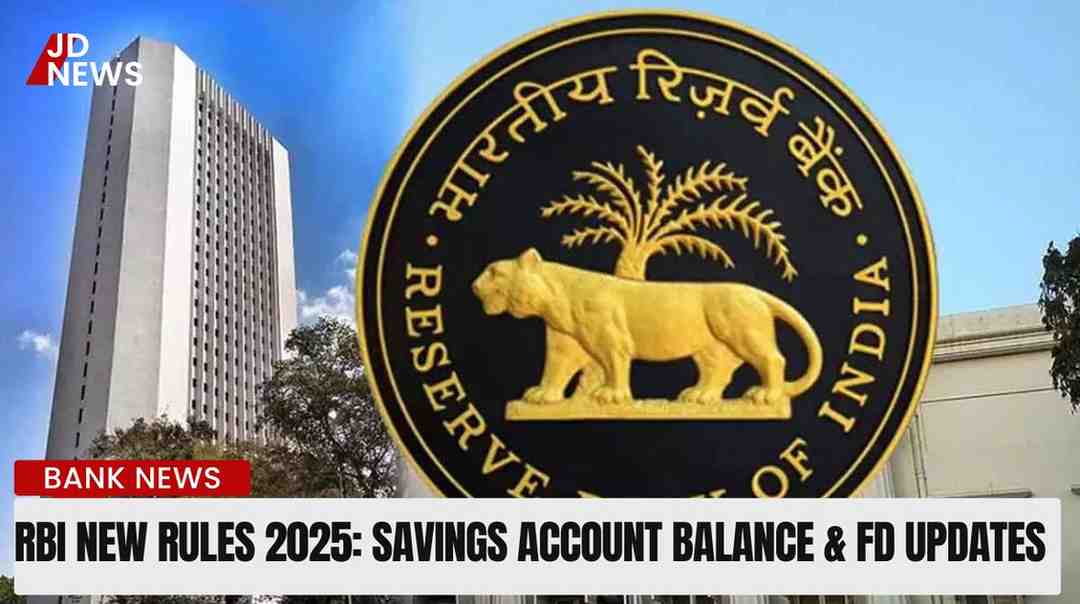RBI Changes Savings Account Rules: New Balance & Interest Guidelines Announced

The Indian banking sector has undergone a major change once again. The Reserve Bank of India (RBI) has issued new rules regarding savings accounts, fixed deposits, and claim settlement of deceased customers. These new rules will impact millions of bank customers. The RBI has clearly stated that it will now be easier to file claims for families, FDs can be broken without penalty, and banks will have greater responsibility. The purpose of this change is to make the banking system more transparent and customer-friendly.
In this article, we'll look at what the RBI's new 2025 guidelines mean for savings account holders, the most recent revisions on fixed deposits, and how the family claim settlement process will alter. We'll discuss whether you can hold up to ₹20 lakh in your savings account and the RBI's new policy on negative balances.
New RBI Rules: Claim Settlement and FD Updates
The most significant adjustment has been made to claim settlement. The RBI allows depositors' families to collect up to ₹15 lakh without legal paperwork in case of death. For co-operative banks, the ceiling is ₹5 lakh. If the bank delays this process, the family will be compensated at the bank rate plus 4% yearly interest.
Fixed Deposit rules have been updated. If a depositor has a fixed deposit or a term deposit and incurs a penalty charge, the lock-in time may be extended. You can apply for a financial emergency loan if you are a parivar.
Can you keep ₹20 Lakh in Savings Account?
Many individuals wonder if it's safe to retain up to ₹20 lakh in a savings account. However, the RBI's Deposit Insurance and Credit Guarantee Corporation (DICGC) only insures up to ₹5 lakh. This means that if the bank defaults, just ₹5 lakh is insured. The remaining funds will be at risk. As a result, experts say that significant monies should be distributed across fixed deposits, mutual funds, and other investments.
Savings Account Rules 2025: What's new?
The RBI has published numerous new rules for 2025. Banks must now ensure that savings account holders receive complete and transparent information about their interest and levies. Hidden costs and unjust fees on balance will now be closely regulated. New rules for negative balances have also been imposed. Banks cannot charge unfair interest or penalties on a negative balance in an account. This improvement is a huge comfort, especially for people who used to have troubles due to inadvertent overdrafts.
New Guidelines for Lockers and Safe Custody
Lockers are also linked to savings accounts. The RBI has also simplified the locker rules. If a customer dies, the bank must notify the family within 15 days and update the locker's inventory date. Delays will result in compensation of ₹5,000 per day.
Broader Impact: Why were these changes necessary
The most significant benefit of these rules will be enhanced trust in the banking sector. Families will no longer have to go through lengthy legal proceedings to receive their deserved money. Customers will be protected from hidden fees and harsh penalties. These RBI actions plainly show that the emphasis is now not only on bank earnings, but also on client protection. The purpose is to increase the banking system's accountability and transparency.
✍️Conclusion
The RBI's new rules for 2025 will have a significant impact on both savings account holders and FD investors. Whether it's quicker claim resolution for families or the ability to break FDs without penalty, every improvement benefits customers. Customers will also benefit considerably from adjustments to savings account balances, negative balance rules, and locker safety. If you have a bank account, it is critical that you understand and apply these rules into your financial plan.
📌Disclaimer The information provided in this blog is for general guidance only and is not intended to serve as financial advice. While the RBI rules mentioned are based on official updates and reports, individual banking experiences may vary. Before making any financial decisions, we recommend consulting your bank or a certified financial advisor.